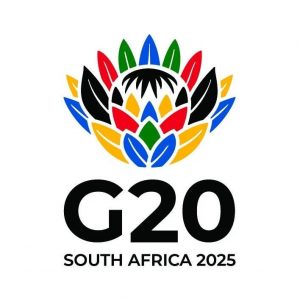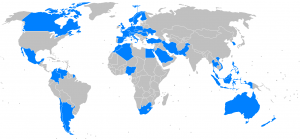
It has been labelled, ‘the crisis of multilateralism’ particularly as it targeted the UN and some of its specialized agencies, like the World Health Organization (WHO) and the United Nations Framework Convention on Climate Change (UNFCCC) . But it seems to me, and I suspect to many other observers and experts that we are beyond just a crisis. With the return of Donald Trump we are witnessing the ‘fading away of multilateralism’. As noted in the WPR, Daily Review:
“Anyone who works on the U.N. or multilateral affairs more generally deserves a very long summer vacation this year. The past six months have wreaked havoc on the U.N. system, as the Trump administration has created enormous financial and political disruption. Many international officials will be heading to the beach unsure of whether they will have jobs by the end of the year due to U.S. funding cuts.”
Well, it is now 80 years in, yes 80 years since the creation of the UN. As pointed out by Richard Gowan who is currently the U.N. director at the International Crisis Group writing in FP:
“Today, the U.N. has 193 members, but amid ongoing bloodshed in Ukraine and Gaza and elsewhere, none of them—including the five veto powers in the Security Council—can pretend that it is succeeding.”
“The Trump administration has meanwhile plunged the institution, which has long been short on cash, into a financial crisis by withholding almost all funds for its activities. Secretary-General António Guterres has directed staff to slash the workforce by a fifth in 2026”
“Big U.N. humanitarian agencies such as the World Food Program, which are heavily reliant on U.S. support, are making even more drastic cuts. In private, very senior international officials speculate that the U.N. may go the way of the League of Nations.”
Well, that statement is rather depressing. So, what is the institution focused on? Well, according to Gowan:
“Diplomats lament the situation but note that their political masters in capitals have other priorities. Governments the world over are concentrating on how to deal with U.S. tariffs and evaluating how Washington’s policies will impact their security. Few have time to worry about multilateral affairs—or the appetite to pick a fight with Trump over second-order concerns in the U.N.system. Officials accept that, at a minimum, the organization will have to take the pain and do “less with less.”” …
“By some criteria, the U.N. has always been a disappointment. The crafters of the U.N. Charter, who proposed the organization at conferences in Dumbarton Oaks and San Francisco, envisaged an organization that would allow the big victorious powers that emerged from World War II—the United States, Soviet Union,China, Britain, and France—to police the world. That vision fell apart almost as soon as the U.N. started to operate, as the Cold War began and the European empires began to disintegrate.”
“One reason that U.N. members are tiptoeing around a broader debate on the organization’s future—in addition to competing priorities with the United States—is that they worry it would degenerate into another shouting match over how to allocate scarce resources to these priorities.”
Even in the face of such difficulties, and they are powerful, Gowan at least hopes there is a future. As he argues:
“Even when it comes to geopolitics, the organization still has a few continuing strengths that are worth recognizing and preserving.
First, it remains a space where the major powers meet, identify each other’s red lines, and bargain on a day-to-day basis at a time when other channels of communication are closed or difficult.”
And he concludes – and I think this is important – there is yet voice and possible progress:
“For the time being, it is necessary to accept that the United Nations will enter its ninth decade smaller and poorer than the past. It is certainly far less influential than its founders hoped. But if it can remain open as a channel both for major power bargaining and for smaller states to make their voices heard, then it will continue to have diplomatic value. If its operational arms can at least maintain services to the world’s neediest populations despite U.S. and other aid cuts, then it will help the vulnerable through a dangerous time.”
“As the U.N.’s members navigate a wildly uncertain world, they should at least aim to maintain some of the organization’s basic contributions to handling global disorder.”
That note of hope is important and I will return to what Gowan describes as “major power bargaining and for smaller states to make their voices heard”. There may yet be forward action; and we need to keep looking for it.
Then there is the dismantling of US aid and multilateral support. As pointed out by the Economist in an article on US foreign aid:
“First the guillotine’s blade fell. Now the death warrant must be signed. Almost as soon as Donald Trump took office for a second time he began defunding programmes he disliked. But under the constitution only Congress has the right to say how America spends its money. So Mr Trump has sent the legislature a “rescission” package, requesting that it claw back $9.4bn of spending that it had previously approved.”
“In 2023 America spent $80bn on foreign aid, including money for humanitarian assistance, development and healthcare. Americans think that they are more generous than they are. When pollsters ask them to estimate what proportion of its budget the federal government spends helping people abroad, the average answer is 26%. In reality it is about 1%, 0.25% of America’s GDP. But the money matters a lot to its intended beneficiaries. America contributes a significant share of the world’s foreign aid, including 40% of humanitarian aid. Reducing that will lead to the closure of some programmes and destabilise international organisations that administer the money, such as the World Health Organisation and World Food Programme.”
As I sit here today finalizing this Post, subject to some saving efforts – PEPFAR – The United States President’s Emergency Plan For AIDS Relief, for instance – the rescission bill seems destined to pass and be signed into law.
Finally, the Informals have not escaped the ‘Trump axe’. In this instance it is not so much funding, though that may happen as well, but action. The G20 is not scheduled to hold its Summit, this year in South Africa, until November 22-23rd. But that has not prevented the US from already being disruptive. The G20, as those who have read this Substack know, or have examined for instance the description of the G20 and its actions at the Global Summitry Project (GSP) website, the G20 is today a highly developed set of Ministerial gatherings, Task Forces, Working Groups and an elaborate set of Engagement Groups all working in some manner toward initiatives at the Summit. Well, key US officials, namely Secretary of State Marco Rubio and Secretary of the Treasury Scott Bessent have chosen to avoid attending their respective ministerial gatherings. Most recently is the Secretary of the Treasury. As pointed out by Colleen Goko and Kopano Gumbi at Reuters:
“Another no-show by U.S. Treasury Secretary Scott Bessent, Donald Trump’s tariff threats and rising tensions between Washington and BRICS countries all look set to overshadow this week’s meeting of G20 finance chiefs in Durban, South Africa.”
“Several key officials including Bessent skipped February’s Cape Town gathering of finance ministers and central banks in the grouping, already raising questions about its ability to tackle pressing global challenges.”
Now Bessent, apparently, will skip this latest G20 finance and central bankers gathering. This has raised real concern about G20 progress. As described by Josh Lipsky, in this same Reuters piece, the chair of international economics at the Atlantic Council:
“I think it’s problematic not to have the world’s largest economy represented at the table, at least at a senior political level,” said Josh Lipsky, chair of international economics at the Atlantic Council.”
“”It raises questions about the G20’s long-term viability,” said Lipsky, adding that Bessent’s absence foreshadowed U.S. plans for a slimmed-down, “back to basics” G20 when it assumes the grouping’s rotating presidency next year.”
We have had continuing discussions among Changing World Dialogue (CWD) colleagues over the impact of U.S. presence or absence for the G20 at South Africa and further the impact of the U.S. G20 hosting role which is set to occur in 2026. I suspect the impact on both is a function of just how disruptive the U.S. might be. Yes, there is a real price to pay for U.S. absence and some think the Informals cannot proceed without the U.S. Yet it seems to me, if the U.S. is determined to torpedo key subjects and possible progress on such issues as climate change or development financing then maybe we can live without it for now.
While I lean, if ever so slightly, to proceeding without U.S. attendance, if the U.S. is determined to be destructive and willful, well then without may be the preference. But for that to occur, it seems to me it can only occur if Major/Middle Powers – some of Canada, Australia, UK, France, Germany, Japan, South Korea, Indonesia or Brazil – are prepared to act collectively and to advance global governance action, at least for now, in plurilateral grouping. I and others have been trained on Major/Middle Power collective efforts. I must say to date there is little development to chronicle. That will need to change. Now, there’s the rub.
More on this as we go forward.


